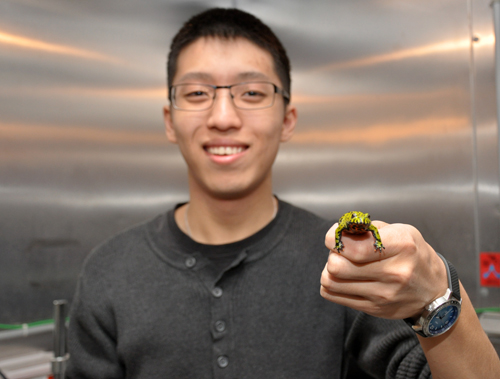
If you ate something that made you feel sick, would you eat it again? Probably not. It turns out that toads are also capable of avoiding foods that sickened them, a phenomenon known as conditioned taste avoidance.
“If they remember that that food made them ill the first time, they should avoid it in the future,” says Eric To, a recent biological sciences graduate, who studied the behaviour in fire-bellied toads with Prof. Fred Laberge, Department of Integrative Biology.
Conditioned taste avoidance in toads is similar to conditioned taste aversion in humans, says To, which often affects cancer patients undergoing chemotherapy. If they eat their favourite foods while experiencing chemotherapy-related symptoms such as nausea, they may develop an aversion to the food, even though their symptoms were triggered by the chemotherapy, not the food itself.
To’s research involved exposing the toads to a novel food (mealworms) dipped in copper sulfate, which made them nauseated and caused them to vomit. When the toads encountered the mealworms again soon after their illness, some toads avoided eating them while others did not. The difference in their ability to learn could be attributed to age or gender, says To. “We’re wondering if there are certain learning types that are involved.” Aside from making the toads sick, the copper sulphate did not harm them, and they recovered from their illness within a day.
The toads are found in southeast Asia, and their diet also includes crickets. To tested their appetite for crickets to ensure that their learning was directly related to the sickness they experienced from eating the contaminated mealworms. He found that the toads ate the crickets readily and avoided the mealworms, which indicated that they learned to avoid a food that made them sick. “They would eat the crickets really quickly,” he says, “so that would allow us to conclude that they didn’t want to eat the mealworms but they were in fact hungry.”
Previous studies had suggested that amphibians were not capable of learning conditioned taste avoidance, which has been observed in birds, mammals and reptiles. Scientists believed that the response to sickening foods developed in these animals after they evolved separately from amphibians.
“Hopefully, it will add a piece of information to the scientific literature,” and inspire further research, says To, who graduated in June with a B.Sc. in biological sciences and a minor in psychology. In 2012, he saw a job posting to work on the frog study. “It seemed like the perfect mix of those two fields: looking at the biology and the psychology that’s involved in this phenomenon,” he says. “Getting to contribute some small bit of information to the scientific world that no one else knows about – that’s really exciting to me.”
He adds that many U of G faculty are eager to open their labs to students interested in doing research and encourages undergraduates to pursue these opportunities to find out what interests them. He plans to take a year off after graduation before applying to medical school.